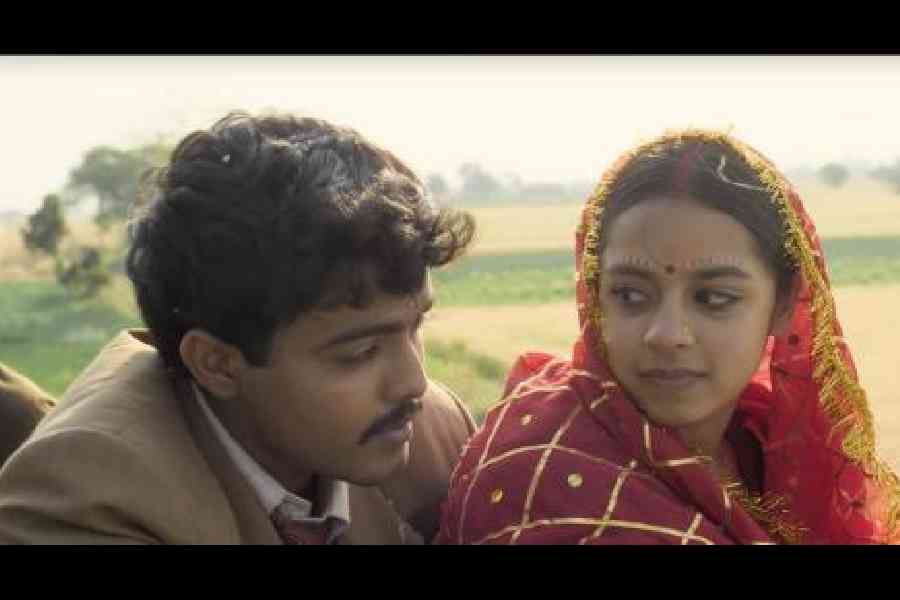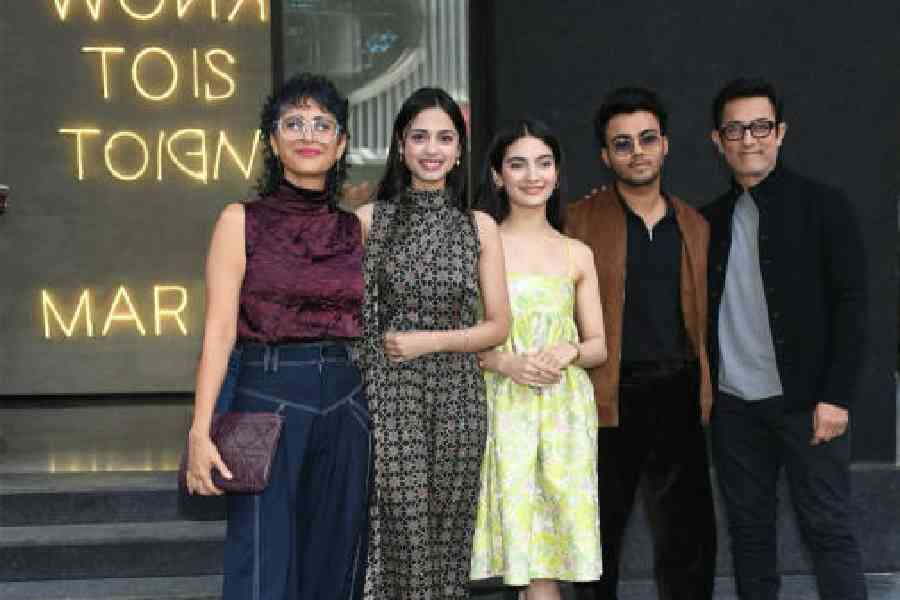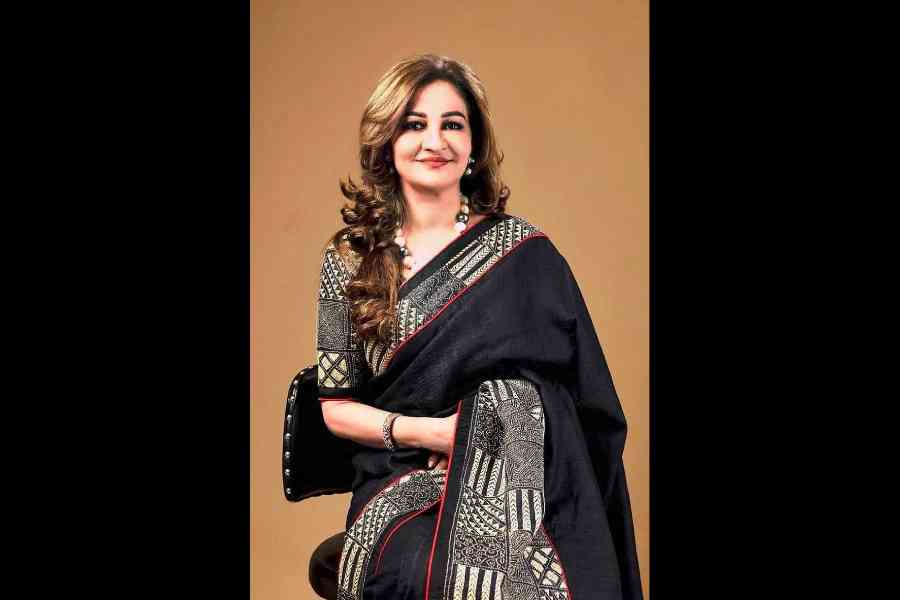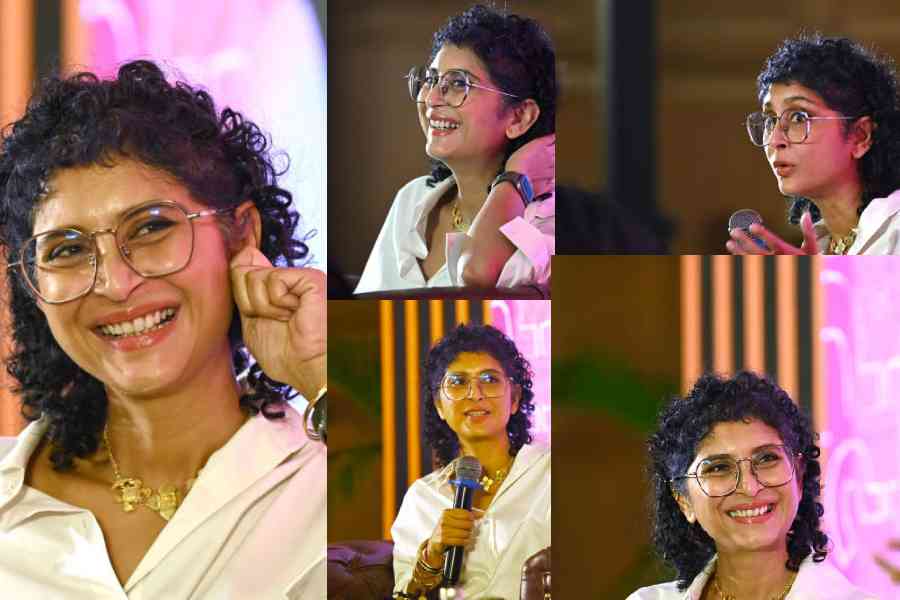There are few as disarmingly honest and charmingly candid as Kiran Rao. Even after her sophomore directorial venture Laapataa Ladies has been picked (out of a list of 29 illustrious films) as India’s representative to the Oscars in the Best International Feature category, Kiran remains her usual simple and ebullient self, always approachable, easy and friendly.
The filmmaker, 50, was in Calcutta recently, about a week after Laapataa Ladies had been picked for the honour. Kiran admitted to t2oS that she was “happily anxious and anxiously happy” with the honour, but her calm demeanour and happy-go-lucky disposition hardly gave that away.
A Calcutta girl for much of her growing-up years, the alumnus of Loreto House and La Martiniere for Girls admitted that she was known as the student “who talked too much and ran around a lot”. That, probably, has contributed to the hustle that Kiran brings to everything that she does... as writer, producer, director, mother, daughter and, most importantly, human being.
After speaking at length about Laapataa Ladies — a slice-of-life film set in rural India of 2001 which looks at the semi-comedic situations spurred by two brides being switched right after marriage and pops in subtle social commentary that hits home effectively — at a session titled ‘Ladies who Lead’, organised by Ladies Study Group, at Taj Bengal, Kiran sat down for a freewheeling chat with t2oS. She talked about the road ahead for Laapataa Ladies, the need for women to increasingly make their way to positions of power in cinema, why watching Korean dramas is her ‘guilty pleasure’ and how travel has given her freedom — and a nickname!
What was the first emotion that popped up when you heard that Laapataa Ladies had been picked as India’s entry to the Oscars in the Best International Feature category?
I was elated, honestly. When the initial disbelief faded, I was beyond delighted because it was something that obviously deep in my heart I had hoped for, but I never really expected.
Laapataa Ladies marks the third time you have been associated with a film sent to the Oscars. You were an assistant director on Lagaan, which made it to the Top 5 shortlist. You also co-produced Peepli [Live] which was chosen as India’s entry to the Academy Awards for the 2008 ceremony. But is the feeling of ownership, having directed the film, more in the case of Laapataa Ladies?

A moment from Laapataa Ladies
I have actually not been there! (Smiles) With Lagaan, I was an assistant director, but I had nothing to do with the (Oscar) campaign. I only heard the stories when Ashu (director Ashutosh Gowariker) and Aamir (Khan, actor and former husband) told us after they came back from the Oscars.
So I have never had a first-hand experience of an Oscar campaign. It is going to be a really interesting new learning curve for me. I have been offered a lot of support and advice by directors and producers who have been sent in the past, especially those who recently have had an experience of the race, and how one plans for it.
We have hit the ground running. Every day is a learning curve for us. There are new ideas, new plans that we are making as we are going along.
Wherever you land up, it is going to be an enriching experience...
For sure. It will be an interesting experience. For me, it will definitely be highly rewarding and enriching. Just the fact that our film was chosen out of 29 Indian films, many of which were such good films, is a huge honour. I consider that an award in itself and, honestly, that, in some way, validates the quality of the film and makes us feel very, very good about having made a good film. There is, of course, the pressure and the responsibility of being the cynosure of all eyes, but at the same time, it is also a huge honour representing your country.
From the Academy Awards to premier festivals like Cannes, Indian cinema, both commercial and indie, is having a moment. Does that give Team Laapataa Ladies some amount of confidence in this Oscar run?
I do think that Indian films are having quite a moment, which is something we should collectively be very proud of. The fact that we have such a variety and diversity of films out there is creditable. Like you said, there is an RRR and at the same time, we have films like Manjummel Boys, which are all doing so well. They are completely different kinds of films. There are quite a few women’s stories that are fast gaining the spotlight. Besides Laapataa Ladies, there is Aatam and All We Imagine As Light.
There is cinema coming in from different parts of the country and going out into the world. It feels like the beginning of a wave and I think we should be very proud that we have come to a place where our films are so diverse. Also, there are a lot of women at the centre of both the storytelling and the story, which is a great thing.
More power to filmmakers like you who have more women on set. But you would agree that things will only change if there are women in positions of power and authority...
Absolutely! We need women in a decision-making role in the filmmaking process because that completely changes the kind of stories you tell and the opportunities that are created for women down the line. So it is important for people like me to hold the door open to encourage more women to step into positions that are decision-making positions where they can be pivotal in the kind of stories that will be told. I think that is already happening; you see it more and more, especially with the number of women producers that there are.
Two years ago, the Oscar we won was brought home by a woman director (Kartiki Gonsalves for The Elephant Whisperers) and woman producer (Guneet Monga Kapoor, also for The Elephant Whisperers). So I feel that our time is slowly coming. We must capitalise on it. We must again hold the door open for each other and show a lot of solidarity with each other. I think that is the only way it happens. I think for too long women have indulged in a kind of crab mentality, of unnecessary competition between us. It is time we moved beyond that.

(L-R) Kiran Rao with her Laapataa Ladies team of Pratibha Ranta, Nitanshi Goel, Sparsh Srivastava and producer Aamir Khan
In the same month that Laapataa Ladies came out, there was also Crew, an as-commercial-as-it-gets Bollywood film frontlined by three women which did quite well at the box office. So the change has definitely started, right?
It just points to the fact that the audiences are ready for good stories. There is a plethora of entertainment at their fingertips and they genuinely don’t have to even go to the cinema to consume something great every weekend. So it shows that only if your film has a great story, people are willing to go to the cinema to watch. People are no longer ‘put off’ by a woman-centric film....
That was so wrong...
Yes, it was. But this was the excuse that most producers would use anytime they were presented with a script which had a woman at the centre of it. It is not like it has changed everything but there is space for more of these kinds of stories. The success of films like Crew encourages us to have these kinds of stories, more in the commercial space as well.
What kind of films do you enjoy watching?
Honestly, of late, I haven’t had the luxury of going to the cinema very much. I think the last film I went for was Dune: Part Two, which was a while ago, and The Zone of Interest.
I do like all kinds of films. It is not a very new film, but I absolutely loved Lijo’s (Malayalam filmmaker Lijo Jose Pellissery) film which translates to ‘Daydream’ (Nanpakal Nerathu Mayakkam, meaning ‘Like an afternoon dream’). I really enjoyed that.
I have quite a varied interest. I am happy to watch suspense, action and drama as well. It depends on what piques my interest at that point.
Even at home, I don’t have much time to watch.
I am a single mom and a lot of my post-work time goes into my family, my parents, my son (Azad). So I really don’t get to watch much. Except Korean dramas. Oh, they are my guilty pleasure! (Laughs)
So you have been bitten by the K-drama bug too...
Yeah! I can’t say that I love them all, though. Honestly, I am that terrible kind of viewer who can watch things at 1.5x speed and zip through bits that I feel are not so interesting. I am definitely not a purist kind of watcher of anything.
Which is your favourite Korean drama?
One of my favourites is Reply 1988. It is a great show about a neighborhood in the ’80s and it reminded me so much of my para in Calcutta while I was growing up in the ’80s.
You have spoken at length about how growing up in Calcutta inculcated the love for art and culture in you. Is there a specific aspect of the city, maybe a habit of your growing-up years, that stays on with you, consciously or subliminally?
The love for reading definitely has to be one of them. The arts, music, theatre, poetry, singing together.... These have stayed with me even so many years after I have left Calcutta.
I was lucky to be exposed to lots of books through my childhood. We didn’t really have many toys but we were exposed to a lot of music as a result of living here. And then, of course, is the food which I have an enduring love for.
What did you end up eating on this trip?
I have to tell you that today I had one of the best meals I have had in Calcutta in a very long time! My producer Tanaji (Dasgupta) took me to a restaurant which I hadn’t ever heard of before but I believe is an institution of sorts. It is called Kasturi. Today, I ate Dhakai Bengali food for the first time in my life and my mind is pretty much blown!
It was absolutely spectacular. I only ate about three or four dishes and I feel I will need to eat there at least 10 more times to sample everything on that menu. It was just phenomenal! I ate Kochupata Diye Chingri Bhapa and Sheel-e-bata Chicken. It was divine!
On this trip, we had planned an extra day just to go around and eat. Calcutta is where I can eat proper, good, authentic, Bong food. But now I have to race back because of the Oscar campaign thing. I am very sad about that.
Are you one of those blessed ones who doesn’t put on weight?
Luckily, my metabolism has always been pretty good so I can eat what I like. But every time I am in Calcutta, I usually go back with a tummy upset because I just keep overeating!
Coming back to films, you have said that you gravitate towards stories of women who ‘run away’. Would that mean escapism or the journey towards a new life and beginning?
What I am interested in is women going on journeys of their own and experiencing a sense of excitement at the potential of travel and how travel actually changes you on the inside and just in the way you can see it on the outside. How it changes you as a person and makes you, in some way, find yourself as a result of that journey is what interests me about women in the sense of ‘running away’ or ‘getting lost’.
At the beginning of the journey of Laapataa Ladies, I was trying to understand what it was about this story that interested me to begin with. I think I was a bit lost at that point in time. As a director, I had so many ideas but I didn’t know where to start.
I was really, really happy being a mum and taking care of my parents and son and my family and all of that, but there was something missing. I was kind of flailing around for a direction to my career. But I feel that was a phase in my life that taught me a lot. I value it because it gave me the space to really enjoy motherhood but also let me develop because I have the privilege of also having a job as a producer-director.
Going on that journey, which I mentioned, for me as well as for any other woman, doesn’t always necessarily mean taking off on the road with a backpack. Being lost, you can very much be where you are without having moved an inch and what makes you happy is the journey you undertake in your heart and mind.
The 13-year gap that you had between Dhobi Ghat, your first film as director, and Laapataa Ladies must have been a nerve-wracking time. But looking back, are you glad you waited it out till the right script came to you?
You know, I tend not to regret anything that I have done. So I can’t say whether I regret not having taken the plunge and made the scripts that I now read and feel are quite decent but at that time, I didn’t (smiles). Honestly, I sometimes ask myself why did I not make them?! I don’t necessarily feel that it was great that I had that time because through that entire period, I was quite frustrated.
But I am grateful that I didn’t have the pressures that many people have to perform and I was able to do things at my own pace, which allowed me to define what kind of story I wanted to tell — as a person within and then outside a marriage, as a mother, as a one-film-old filmmaker... lots of things that needed clarification in my own head. It allowed me the space and pause to do that.
Your Instagram bio says ‘Most often laapataa’. Have you found a kind of oasis of privacy even within the fishbowl life that you and your family lead?
I had come back to Instagram after three years of being away from it and even when I was on Instagram earlier, it was a private account. I am not a hugely public person in any sense. When I wrote that, more than anything else, it was to sort of caution everyone who follows me that I am not going to be posting every moment or every day or keeping people highly updated on my life. For me, Instagram is a place for expression. And I guess I will sort of come and go when I feel the need to express myself.
Honestly, I value time for myself a lot more now. I realise that public life comes with huge challenges and that self-care and giving oneself space and time is just about the most important thing in the world today.
You just spoke about the transformative power of travel, literally and metaphorically. How does travel fuel you, both as a person and a filmmaker?
I feel that in some ways, I am umbilically and directly connected to my forager and hunter-gatherer ancestors. That is because travel gives me an endorphin, dopamine, all the good neurotransmitters kind of rush that perhaps nothing else does.
I just feel good every time I am off on a journey, even if it is to just come to Calcutta. I think it makes me feel like I am on a little island of my own, but also that I am floating through the world and collecting experiences and collecting friends and ideas as well.
I think as a creative person that’s really important. Travel gives me enough time to myself even though I am often surrounded by people. That is because it allows me to leave my otherwise routine life behind.
I absolutely love travel! In fact, my friends have nicknamed me ‘Dakiya’ because they are like: ‘You are like a postman! (Laughs) You are never in one place at any point in time. You are constantly travelling’.
I have a farm outside Bombay which is my haven, it is my little shangri-la. I have friends in different parts of the country... in Goa and in the mountains and I take off as often as I can. I have my parents in Bangalore. I also get to travel for work. So I end up travelling a fair bit and that is one of life’s greatest loves and greatest privileges for me, honestly. It is a real privilege to be able to travel, given how unsustainable the whole process is. In fact, I feel guilty sometimes but travel is something that I love too much to give up.
Do you ever revisit that brief appearance you had as an ‘actor’ in Dil Chahta Hai?
Oh my God (Laughs)! I would have never ever thought that it would get the kind of attention and viewership and the kind of conversation that it has had over the years.
Honestly, it was the most random thing. I was the extras coordinator on that shoot and because of that, I was put in a costume which happened to be a two-piece swimsuit and be on the beach in the background with the extras. And then, suddenly, I found myself in the shot because they wanted someone who seemed like they could be an ‘actor’ (laughs) for that brief appearance. And would you believe it, it is on my IMDB resume (as ‘Deepa’s friend in hotel lobby in Goa’) and I just find it hilarious! But it was a fun shoot and so it is fun to rewatch it and look at myself.

Kiran Rao delivered an insightful and captivating talk that deeply resonated with the Ladies Study Group members. More than just a glimpse into her journey, it was a masterclass in creativity, passion, and resilience. Kiran’s ability to blend her personal experiences with her professional achievements offered our members a unique perspective on the power of storytelling. She spoke candidly about her path from Calcutta to becoming a leading voice in Hindi cinema.
The session was not only inspiring but also sparked a lively dialogue among our members, prompting them to think more deeply about the narratives that shape our society and the impact of cinema on culture. We are incredibly proud of Kiran’s accomplishments, especially with her latest film, Laapataa Ladies, being selected as India’s official entry for the 2025 Oscars
— Minnie Juneja, president, Ladies Study Group Calcutta chapter










